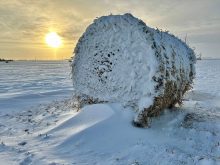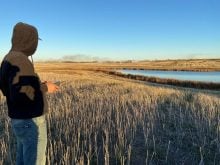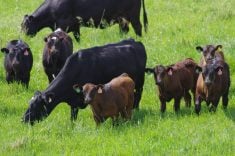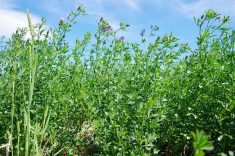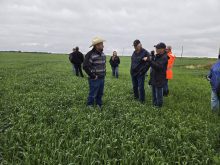CAROL SHWETZ
DVM
Tracking body condition by placing your hands on the horse to feel through the thick winter coat will tell you whether its body condition is adequate.
A horse’s lifestyle changes in winter. It must. His external environment changes. The outside changes initiate changes to the inside of the horse that affect his entire well-being.
The fresh, crisp air of winter revitalizes the horse’s respiratory system. Deworming at the onset of winter brings horses many months of freedom from burdensome parasites. These are obvious advantages. Others make themselves known after many months.
Read Also

Manitoba sunflower plant gets local owners
Scoular’s sunflower and bird feed plant in Winkler, Man., bought by Orenda Commodity Services Ltd. out of Ste. Agathe.
Horses are naturally adapt at thriving in the winter season on well-prepared, snow-covered pastures. Pastures can be fashioned to stockpile forages for winter grazing. Of course, horses which have been removed from their natural environment for many years will need supervision and an intergration period to be fully capable of benefiting from the offerings of winter.
Tracking body condition by placing your hands on the horse to feel through the thick winter coat will tell you whether its body condition is adequate. It is acceptable to feel the ribs. It is not acceptable to feel backbone.
Horses are content with the colder temperatures. At temperatures below freezing, wooded regions, porosity fences, and open-faced shelters break the wind chill and keep most horses very comfortable. Horses are very adept at keeping themselves warm. Stored body fat from times when the forage is good acts as insulation and stored energy for times when forage isn’t so good.
Although it is appropriate for horses to gain fat stores, it is equally appropriate if not essential to their health to lose fat stores that have accumulated. Fat stores that continue to remain on a horse’s body year after year without loss becomes stale and hard. In the natural course of seasonal flux horses would lose weight over the winter. It is difficult to initiate weight loss during the summer when pastures are rich and lush. Winter months provide the ideal window of opportunity offering four to six months of slow, effortless weight loss in a healthy, life-giving manner. It is a good advantage to offer domestic horses.
Although horses grow long, thick hair coats to keep them warm, as it becomes colder the most important way available to horses to keep warm is eating. Forages are fermented in the hindgut and give off long-lasting heat. This is much like how steam rises from your fermenting manure pile. Horses use this heat to maintain their core body temperature. Their furnace is internal and it is stoked by roughage. Grains and warm bran mashes temporarily warm the horse but it won’t cause internal heating like hay and the coarse forages underlying snow cover.
In general the health of horse’s hooves improve over winter’s four to six months. The frozen terrain offers a firm ground surface and snow serves as a sole pack. This combination improves blood flow within the hoof capsule.
Horses on winter range move through out the day. They must to consume enough to meet their caloric needs. This movement tones their bodies and brings with it a physical and mental freshness.




